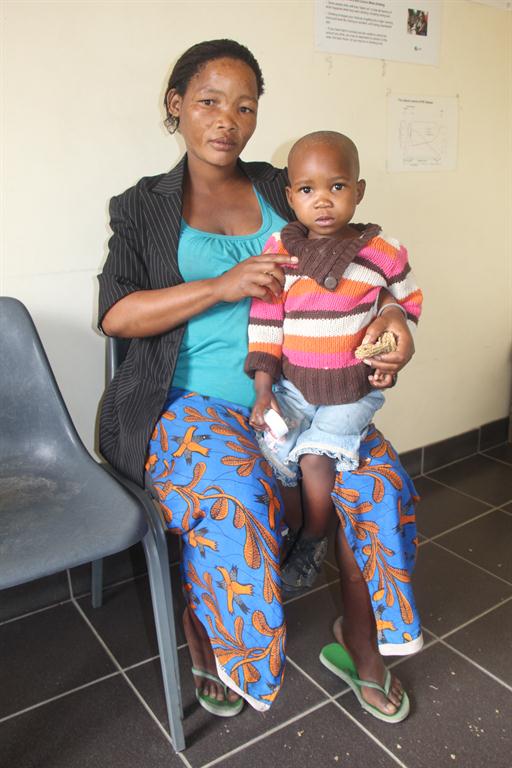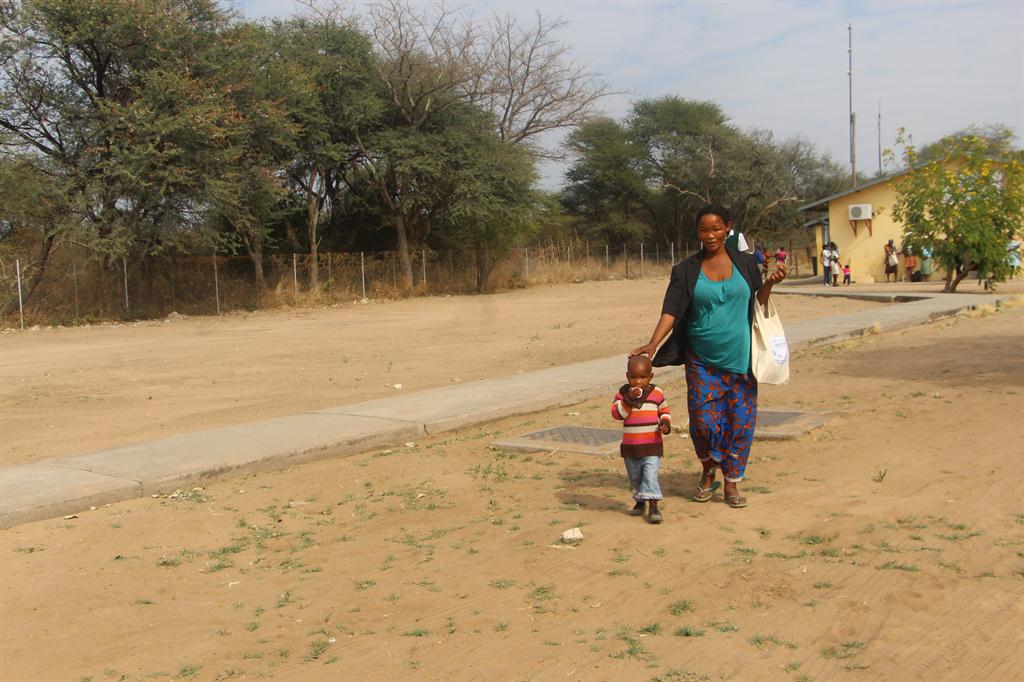HIV battle rages on
Challenges due to very high poverty levels continue to hamper efforts to combat HIV transmission from mother to child, amongst others.
Since its inception in 2015, the Early Infant Diagnosis Programme, spearheaded by the US government, has been working hand in hand with the health ministry to prevent HIV transmission from mother-to-child through the prevention of mother-to-child transmission (PMTCT) drug.
Anna-Blanka Kanyondi, 30, is one of the many women in Nyangana district in the Kavango East Region living with the virus and who is on this treatment.
A mother of three, Kanyondi is expecting her fourth child in December.
Kanyondi's HIV-positive status was disclosed to her in 2008 during her first pregnancy.
“I used to live in the bush, far away from hospitals and other health centres. I was however fortunate enough to go through the PMTCT programme, so my first child was born HIV negative and free from the virus,” she recalls.
However, during her second pregnancy in 2013, Kanyondi's marriage was rocked with conflict and misunderstandings and when the union became irreconcilable, she was forced to move and settle far away from the hospital.
The new location made it impossible for her to afford the transport costs for regular check-ups and to get her medicine.
As a result, she stopped her treatment while she was pregnant with her second child.
Consequently, her baby was born with HIV.
In 2015 after falling pregnant for the third time, she continued with her treatment and her baby girl was born HIV negative.
But her challenges do not end with accessing medication. Kanyondi and her husband, who is also living with the virus are both unemployed and she told Namibian Sun that due to her financial incapacity, “it is difficult to eat all the healthy foods that are required when you are positive,” she said.
“We are only living in poverty. Since both my husband and I are unemployed, we are dependent on the government social grant. Every month each of my three children receive N$250 and that is what we survive on. It is not enough for a family of five,” adds Kanyondi, who has been living with the virus for the past nine years.
Disadvantaged
A data clerk at the Nyangana District Hospital, Maria Utare, said the majority of the residents in the district are from disadvantaged backgrounds have a challenge sticking to their treatment regime.
“Although we provide health and sex education to the villagers, most of them are not willing to go on family planning and are reluctant to get tested. This is why most of the women here only learn about their status during pregnancy,” Utare explained.
However, all hope is not lost. Utare added that more people are being educated about the benefits of being tested and she has noticed a change in the attitude of most of the residents.
“We have a lot of community health workers who go out into the field to educate the people so that they become aware of the benefits of getting treatment if you are positive, and the need for pregnant mothers to take up PMTCT early in their first trimester, as well as information on the use of contraceptives,” Utare said.
Speaking at a recently celebrated event in Nyangana, American ambassador Thomas Daughton said: “It is no secret that the highest risk period of HIV-positive infants is the first three months. Therefore, every effort must be made to ensure that children of positive mothers be diagnosed quickly in order to put them on treatment immediately.” In Kanyondi's situation, she recalls using the oral contraceptive pill, but she said she always forgot to take it and had encountered problems using the other contraceptive methods. “I was on the injection in the past as well, but my menstrual cycle was unstable so I stopped,” she explained.
Kanyondi and her family are currently living within walking distance of the hospital hence she no longer has problems going for check-ups and getting her treatment.
ARV therapy
Namibia has a high prevalence of HIV infections transmitted through unprotected sexual intercourse with 5% of new HIV infections in 2010/11 due to mother-to-child transmissions, according to the World Health Organisation.
Further, from 2005 through to 2010, HIV testing among pregnant women increased from 47% to 86% and maternal antiretroviral therapy coverage increased from 60% in 2009 to 85% in 2011.
But, with the help of the Early Infant Diagnosis Programme, funded by the US government through the President's Emergency Plan for Aids Relief (Pepfar), and implemented by IntraHealth International in collaboration with the health ministry, mothers on treatment are able to give birth to healthy babies and live a normal lifestyle.
Although Kanyondi is not educated, she makes sure her children are receiving an education and they are going to school.
“The reason why I am in this situation is because I am not educated. I will try my best to put my children through school with the little that I have,” she said. Her first-born is in Grade 3 while her second child will start pre-primary next year.
TUNOHOLE MUNGOBA
Anna-Blanka Kanyondi, 30, is one of the many women in Nyangana district in the Kavango East Region living with the virus and who is on this treatment.
A mother of three, Kanyondi is expecting her fourth child in December.
Kanyondi's HIV-positive status was disclosed to her in 2008 during her first pregnancy.
“I used to live in the bush, far away from hospitals and other health centres. I was however fortunate enough to go through the PMTCT programme, so my first child was born HIV negative and free from the virus,” she recalls.
However, during her second pregnancy in 2013, Kanyondi's marriage was rocked with conflict and misunderstandings and when the union became irreconcilable, she was forced to move and settle far away from the hospital.
The new location made it impossible for her to afford the transport costs for regular check-ups and to get her medicine.
As a result, she stopped her treatment while she was pregnant with her second child.
Consequently, her baby was born with HIV.
In 2015 after falling pregnant for the third time, she continued with her treatment and her baby girl was born HIV negative.
But her challenges do not end with accessing medication. Kanyondi and her husband, who is also living with the virus are both unemployed and she told Namibian Sun that due to her financial incapacity, “it is difficult to eat all the healthy foods that are required when you are positive,” she said.
“We are only living in poverty. Since both my husband and I are unemployed, we are dependent on the government social grant. Every month each of my three children receive N$250 and that is what we survive on. It is not enough for a family of five,” adds Kanyondi, who has been living with the virus for the past nine years.
Disadvantaged
A data clerk at the Nyangana District Hospital, Maria Utare, said the majority of the residents in the district are from disadvantaged backgrounds have a challenge sticking to their treatment regime.
“Although we provide health and sex education to the villagers, most of them are not willing to go on family planning and are reluctant to get tested. This is why most of the women here only learn about their status during pregnancy,” Utare explained.
However, all hope is not lost. Utare added that more people are being educated about the benefits of being tested and she has noticed a change in the attitude of most of the residents.
“We have a lot of community health workers who go out into the field to educate the people so that they become aware of the benefits of getting treatment if you are positive, and the need for pregnant mothers to take up PMTCT early in their first trimester, as well as information on the use of contraceptives,” Utare said.
Speaking at a recently celebrated event in Nyangana, American ambassador Thomas Daughton said: “It is no secret that the highest risk period of HIV-positive infants is the first three months. Therefore, every effort must be made to ensure that children of positive mothers be diagnosed quickly in order to put them on treatment immediately.” In Kanyondi's situation, she recalls using the oral contraceptive pill, but she said she always forgot to take it and had encountered problems using the other contraceptive methods. “I was on the injection in the past as well, but my menstrual cycle was unstable so I stopped,” she explained.
Kanyondi and her family are currently living within walking distance of the hospital hence she no longer has problems going for check-ups and getting her treatment.
ARV therapy
Namibia has a high prevalence of HIV infections transmitted through unprotected sexual intercourse with 5% of new HIV infections in 2010/11 due to mother-to-child transmissions, according to the World Health Organisation.
Further, from 2005 through to 2010, HIV testing among pregnant women increased from 47% to 86% and maternal antiretroviral therapy coverage increased from 60% in 2009 to 85% in 2011.
But, with the help of the Early Infant Diagnosis Programme, funded by the US government through the President's Emergency Plan for Aids Relief (Pepfar), and implemented by IntraHealth International in collaboration with the health ministry, mothers on treatment are able to give birth to healthy babies and live a normal lifestyle.
Although Kanyondi is not educated, she makes sure her children are receiving an education and they are going to school.
“The reason why I am in this situation is because I am not educated. I will try my best to put my children through school with the little that I have,” she said. Her first-born is in Grade 3 while her second child will start pre-primary next year.
TUNOHOLE MUNGOBA






Comments
Namibian Sun
No comments have been left on this article